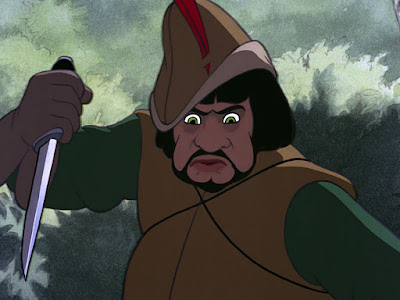Reading Notes: Part B for Week 4: The Odyssey - The Sirens, Scylla, and Charybdis
For this section of the reading, I was most fascinated by the story of the mens' encounter with the Sirens, Scylla, and Charybdis. This story was by far the most action-packed out of this week's readings, and the story tells of unearthly creatures that prove to be of danger to the men.
After Odysseus speaks with the ghost from the House of Hades, he returns to his men aboard the ship. They push off from the island and make course towards the island of the Sirens. At this point, knowing the inherent dangers and allure of the Sirens, Odysseus cuts upon a cake of beeswax, kneading the slivers in his hand with the light of the sun. He proceeds to plug the ears of each of his men and tie himself to the mast, restrained by his arms and legs. They pass the island of the Sirens with little issue, aside from the fact that Odysseus longed for his men to veer off course and go toward the allure of the Sirens. Yet, his men, ears plugged with beeswax, kept rowing past the island and escaped the fate of the Sirens.
Soon after, the mens' ship was met with huge breakers upon a rough open sea. The huge waves unsettled the men from their rowing positions, and the ship lost way. Yet, Odysseus, sensing his men were frightened, gave them cause for hope. For these men have bested the Cyclops and escaped the house of Circe, Odysseus motivates and guides them into rowing the ship by the shore.
Soon thereafter, Scylla and Charybdis appear, pinning the men and their ship between them. Petrified with utter fear, the men turned pale and weak at the sight of Scylla. Scylla proceeds to seize six of the men from the deck of the ship; Odysseus is met with the sight of his fellow mens' legs and arms dangling above his own head. The seized men are dragged effortlessly towards the island where Scylla proceeds to feast upon them, just as the men let our their final pitiful cries of disdain.
I like the story of the mens' encounter with Scylla and Charybdis. During this part of the story, readers can empathize with mens' emotions as they encounter such a horrid sea monster. Struck with fear, the men freeze, yet Odysseus is able to lead them. This story demonstrates how strong of a leader Odysseus was and how loyal his fellow men were. Yet, through several perilous endeavors, his men still follow him.
Bibliography: The Sirens, Scylla, and Charybdis from Homer's Odyssey, translated into English by Tony Kline (2004)
After Odysseus speaks with the ghost from the House of Hades, he returns to his men aboard the ship. They push off from the island and make course towards the island of the Sirens. At this point, knowing the inherent dangers and allure of the Sirens, Odysseus cuts upon a cake of beeswax, kneading the slivers in his hand with the light of the sun. He proceeds to plug the ears of each of his men and tie himself to the mast, restrained by his arms and legs. They pass the island of the Sirens with little issue, aside from the fact that Odysseus longed for his men to veer off course and go toward the allure of the Sirens. Yet, his men, ears plugged with beeswax, kept rowing past the island and escaped the fate of the Sirens.
Soon after, the mens' ship was met with huge breakers upon a rough open sea. The huge waves unsettled the men from their rowing positions, and the ship lost way. Yet, Odysseus, sensing his men were frightened, gave them cause for hope. For these men have bested the Cyclops and escaped the house of Circe, Odysseus motivates and guides them into rowing the ship by the shore.
Soon thereafter, Scylla and Charybdis appear, pinning the men and their ship between them. Petrified with utter fear, the men turned pale and weak at the sight of Scylla. Scylla proceeds to seize six of the men from the deck of the ship; Odysseus is met with the sight of his fellow mens' legs and arms dangling above his own head. The seized men are dragged effortlessly towards the island where Scylla proceeds to feast upon them, just as the men let our their final pitiful cries of disdain.
I like the story of the mens' encounter with Scylla and Charybdis. During this part of the story, readers can empathize with mens' emotions as they encounter such a horrid sea monster. Struck with fear, the men freeze, yet Odysseus is able to lead them. This story demonstrates how strong of a leader Odysseus was and how loyal his fellow men were. Yet, through several perilous endeavors, his men still follow him.
Scylla and Charybdis - Courtesy of OdysseythePodcast
Bibliography: The Sirens, Scylla, and Charybdis from Homer's Odyssey, translated into English by Tony Kline (2004)




Comments
Post a Comment